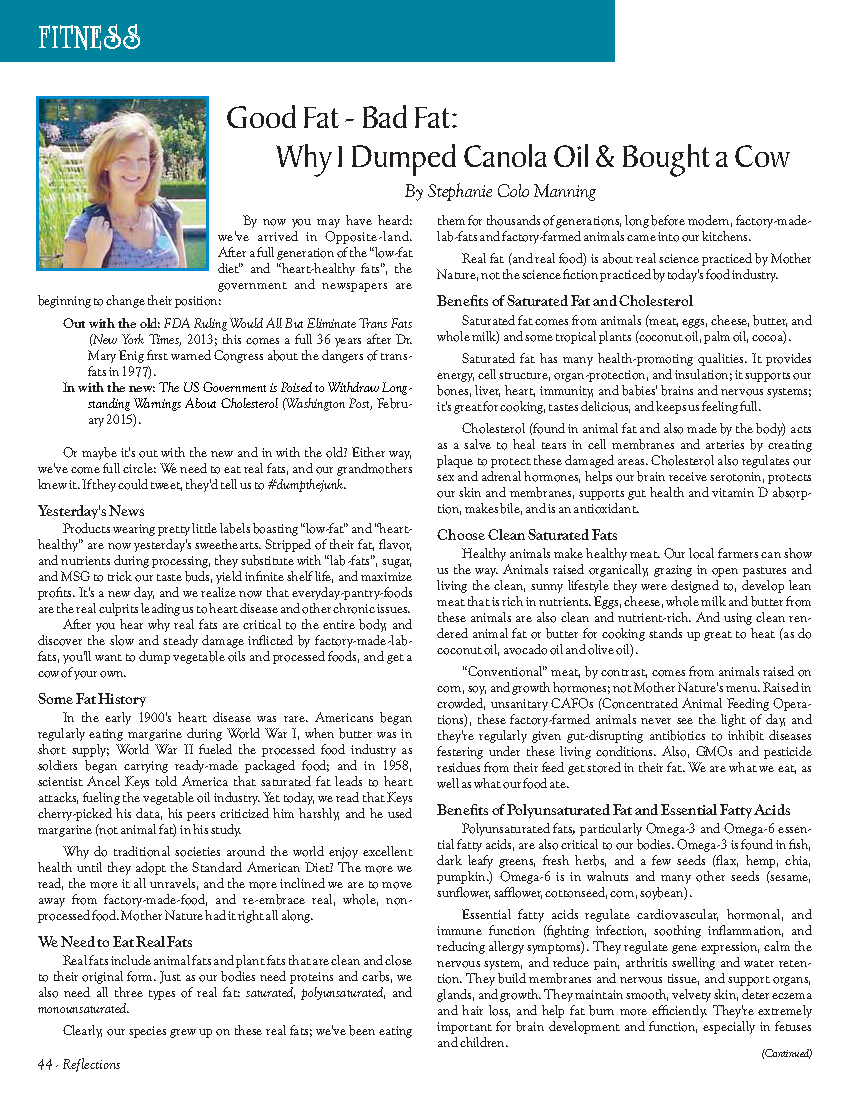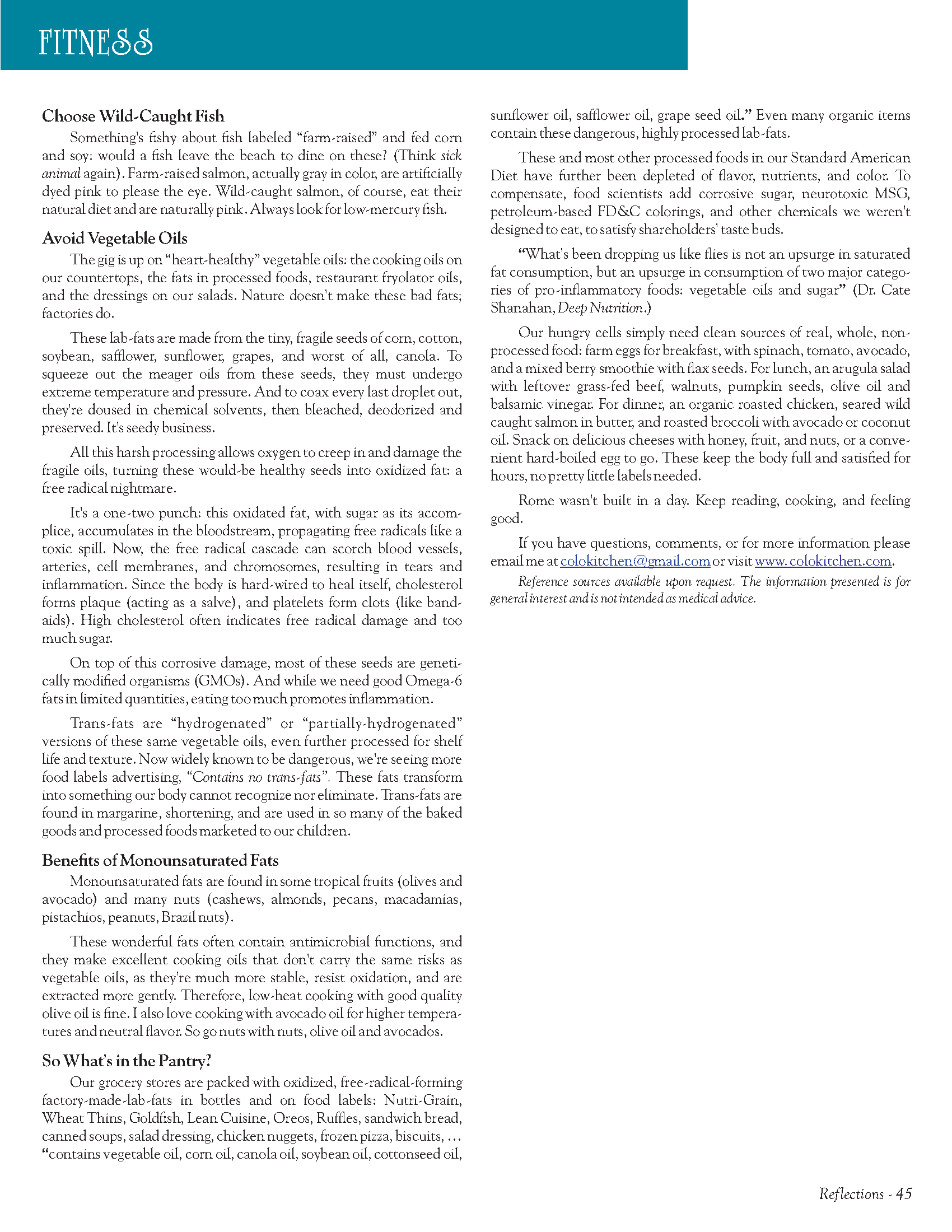By now you may have heard: we’ve arrived in Opposite-land. After a full generation of the “low-fat diet” and “heart-healthy fats”, the government and newspapers are beginning to change their position:
Out with the old: FDA Ruling Would All But Eliminate Trans Fats (New York Times, 2013; this comes a full 36 years after Dr. Mary Enig first warned Congress about the dangers of trans-fats in 1977).
In with the new: The US Government is Poised to Withdraw Longstanding Warnings About Cholesterol (Washington Post, February 2015).
Or maybe it’s out with the new and in with the old? Either way, we’ve come full circle: We need to eat real fats, and our grandmothers knew it. If they could tweet, they’d tell us to #dumpthejunk.
Yesterday’s News
Products wearing pretty little labels boasting “low-fat” and “heart-healthy” are now yesterday’s sweethearts. Stripped of their fat, flavor, and nutrients during processing, they substitute with “lab-fats”, sugar, and MSG to trick our taste buds, yield infinite shelf life, and maximize profits. It’s a new day, and we realize now that everyday-pantry-foods are the real culprits leading us to heart disease and other chronic issues.
After you hear why real fats are critical to the entire body, and discover the slow and steady damage inflicted by factory-made-lab-fats, you’ll want to dump vegetable oils and processed foods, and get a cow of your own!
Some Fat History
In the early 1900’s heart disease was rare. Americans began regularly eating margarine during World War I, when butter was in short supply; World War II fueled the processed food industry as soldiers began carrying ready-made packaged food; and in 1958, scientist Ancel Keys told America that saturated fat leads to heart attacks, fueling the vegetable oil industry. Yet today, we read that Keys cherry-picked his data, his peers criticized him harshly, and he used margarine (not animal fat) in his study.
Why do traditional societies around the world enjoy excellent health until they adopt the Standard American Diet? The more we read, the more it all unravels, and the more inclined we are to move away from factory-made-food, and re-embrace real, whole, non-processed food. Mother Nature had it right all along.
We Need to Eat Real Fats
Real fats include animal fats and plant fats that are clean and close to their original form. Just as our bodies need proteins and carbs, we also need all three types of real fat: saturated, polyunsaturated, and monounsaturated.
Clearly, our species grew up on these real fats; we’ve been eating them for thousands of generations, long before modern, factory-made-lab-fats and factory-farmed animals came into our kitchens.
Real fat (and real food) is about real science practiced by Mother Nature, not the science fiction practiced by today’s food industry.
Benefits of Saturated Fat & Cholesterol
Saturated fat comes from animals (meat, eggs, cheese, butter, and whole milk) and some tropical plants (coconut oil, palm oil, cocoa).
Saturated fat has many health-promoting qualities. It provides energy, cell structure, organ-protection, and insulation; it supports our bones, liver, heart, immunity, and babies’ brains and nervous systems; it’s great for cooking, tastes delicious, and keeps us feeling full.
Cholesterol (found in animal fat and also made by the body) acts as a salve to heal tears in cell membranes and arteries by creating plaque to protect these damaged areas. “Blaming coronary heart disease on cholesterol is like blaming the police for murder and theft in a high crime area” (Sally Fallon, Nourishing Traditions). Cholesterol also regulates our sex and adrenal hormones, helps our brain receive serotonin, protects our skin and membranes, supports gut health and vitamin D absorption, makes bile, and is an antioxidant.
Choose Clean Saturated Fats
Healthy animals make healthy meat. Our local farmers can show us the way. Animals raised organically, grazing in open pastures and living the clean, sunny lifestyle they were designed to, develop lean meat that is rich in nutrients. Eggs, cheese, whole milk and butter from these animals are also clean and nutrient-rich. And using clean, rendered animal fat or butter for cooking stands up great to heat (as do coconut oil, avocado oil and olive oil, as we’ll see.)
“Conventional” meat, by contrast, comes from animals raised on corn, soy, and growth hormones; not Mother Nature’s menu. Raised in crowded, unsanitary CAFOs (Concentrated Animal Feeding Operations), these factory-farmed animals never see the light of day, and they’re regularly given gut-disrupting antibiotics to inhibit diseases festering under these living conditions. Also, GMOs and pesticide residues from their feed get stored in their fat. We are what we eat, as well as what our food ate.
Benefits of Polyunsaturated Fat & Essential Fatty Acids
Polyunsaturated Fats, particularly Omega-3 and Omega-6 Essential Fatty Acids, are also critical to our bodies. Omega-3 is found in fish, dark leafy greens, fresh herbs, and a few seeds (flax, hemp, chia, pumpkin.) Omega-6 is in walnuts and many other seeds (sesame, sunflower, safflower, cottonseed, corn, soybean.)
Essential fatty acids regulate cardiovascular, hormonal, and immune function (fighting infection, soothing inflammation, and reducing allergy symptoms.) They regulate gene expression, calm the nervous system, and reduce pain, arthritis swelling and water retention. They build membranes and nervous tissue, and support organs, glands, and growth. They maintain smooth, velvety skin, deter eczema and hair loss, and help fat burn more efficiently. They’re extremely important for brain development and function, especially in fetuses and children.
Choose Wild-Caught Fish
Something’s fishy about fish labeled “farm-raised” and fed corn and soy: would a fish leave the beach to dine on these? (Think sick animal again). Farm-raised salmon, actually gray in color, are artificially dyed pink to please the eye. Wild-caught salmon, of course, eat their natural diet and are naturally pink. Always look for low-mercury fish.
Avoid Vegetable Oils
The gig is up on “heart-healthy” vegetable oils: the cooking oils on our countertops, the fats in processed foods, restaurant fryolator oils, and the dressings on our salads. Nature doesn’t make these bad fats; factories do.
These lab-fats are made from the tiny, fragile seeds of corn, cotton, soybean, safflower, sunflower, grapes, and worst of all, canola. To squeeze out the meager oils from these seeds, they must undergo extreme temperature and pressure. And to coax every last droplet out, they’re doused in chemical solvents, then bleached, deodorized and preserved. It’s seedy business.
All this harsh processing allows oxygen to creep in and damage the fragile oils, turning these would-be healthy seeds into oxidized fat: a free radical nightmare.
It’s a one-two punch: this oxidated fat, with sugar as its accomplice, accumulates in the bloodstream, propagating free radicals like a toxic spill. Now, the free radical cascade can scorch blood vessels, arteries, cell membranes, and chromosomes, resulting in tears and inflammation. Since the body is hard-wired to heal itself, cholesterol forms plaque (acting as a salve), and platelets form clots (like band-aids). High cholesterol often indicates free radical damage and too much sugar.
On top of this corrosive damage, most of these seeds are genetically modified organisms (GMOs). And while we need good Omega-6 fats in limited quantities, eating too much promotes inflammation.
Trans-fats are “hydrogenated” or “partially-hydrogenated” versions of these same vegetable oils, even further processed for shelf life and texture. Now widely known to be dangerous, we’re seeing more food labels advertising “Contains no trans-fats”. These fats transform into something our body cannot recognize nor eliminate. Trans-fats are found in margarine, shortening, and are used in so many of the baked goods and processed foods marketed to our children.
Benefits of Monounsaturated Fats
Monounsaturated Fats are found in some tropical fruits (olives and avocado) and many nuts (cashews, almonds, pecans, macadamias, pistachios, peanuts, Brazil nuts).
These wonderful fats often contain antimicrobial functions, and they make excellent cooking oils that don’t carry the same risks as vegetable oils, as they’re much more stable, resist oxidation, and are extracted more gently. Therefore, low-heat cooking with good quality olive oil is fine. I also love cooking with avocado oil for higher temperatures and neutral flavor. So go nuts with nuts, olive oil and avocados!
So What’s in the Pantry?
Our grocery stores are packed with oxidized, free-radical-forming factory-made-lab-fats in bottles and on food labels: Nutri-Grain, Wheat Thins, Goldfish, Lean Cuisine, Oreos, Ruffles, sandwich bread, canned soups, salad dressing, chicken nuggets, frozen pizza, biscuits, … “contains vegetable oil, corn oil, canola oil, soybean oil, cottonseed oil, sunflower oil, safflower oil, grape seed oil.” Even many organic items contain these dangerous, highly processed lab-fats.
These and most other processed foods in our Standard American Diet have further been depleted of flavor, nutrients, and color. To compensate, food scientists add corrosive sugar, neurotoxic MSG, petroleum-based FD&C colorings, and other chemicals we weren’t designed to eat, to satisfy shareholders’ taste buds.
“What’s been dropping us like flies is not an upsurge in saturated fat consumption, but an upsurge in consumption of two major categories of pro-inflammatory foods: vegetable oils and sugar” (Dr. Cate Shanahan, Deep Nutrition.)
Our hungry cells simply need clean sources of real, whole, non-processed food: Farm eggs for breakfast, with spinach, tomato, avocado, and a mixed berry smoothie with flax seeds. For lunch, an arugula salad with leftover grass-fed beef, walnuts, pumpkin seeds, olive oil and balsamic vinegar. For dinner, an organic roasted chicken, seared wild caught salmon in butter, and roasted broccoli with avocado or coconut oil. Snack on delicious cheeses with honey, fruit, and nuts, or a convenient hard-boiled egg to go. These keep the body full and satisfied for hours, no pretty little labels needed!
Rome wasn’t built in a day. Keep reading, cooking, and feeling good!
Stephanie Colo Manning holds a Master of Science degree in Holistic Nutrition. The information presented has not been evaluated by the FDA and is not intended to diagnose, treat, prevent, or cure any disease. References available upon request.
Sources: Nourishing Traditions by Sally Fallon; Deep Nutrition: Why Your Genes Need Traditional food by Cate Shanahan; Nutritional Sciences: From Fundamentals to Food by Michelle McGuire and Kathy A. Beerman; The World’s Healthiest Foods by George Mateljan; Overview of Fats Hawthorn University lecture by Paula Bartholomy; F.D.A Ruling Would All But Eliminate Trans Fats, New York Times article by S. Tavernise; The U.S. Government is Poised to Withdraw Longstanding Warnings About Cholesterol, Washington Post article by P. Whoriskey; The Surprisingly Interesting History of Margarine by E. Trex; and more.
The information presented is for general interest and is not intended as medical advice.


